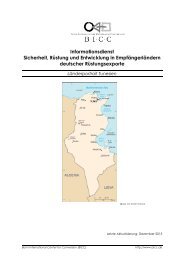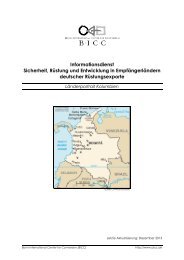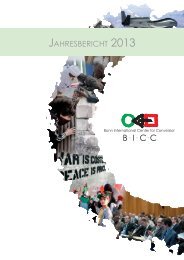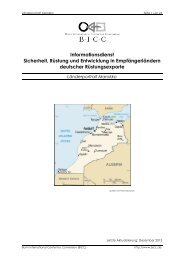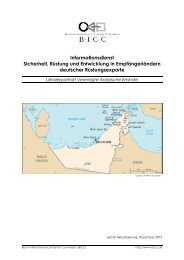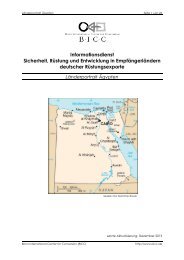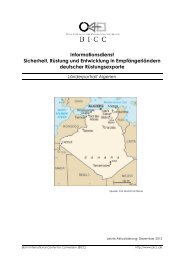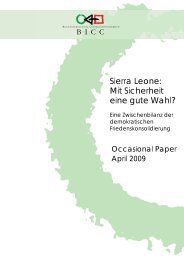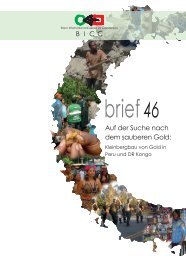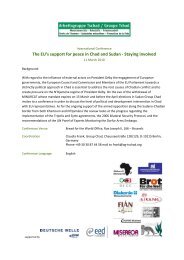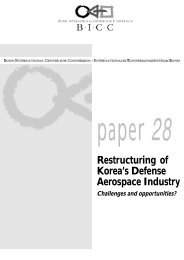English - BICC
English - BICC
English - BICC
Create successful ePaper yourself
Turn your PDF publications into a flip-book with our unique Google optimized e-Paper software.
decommissioning in the hope that<br />
Republicans might follow suit (Irish<br />
Times, 23 March 1995) and felt that the<br />
paramilitaries and their political<br />
representatives should make their own<br />
proposals to break the impasse “rather<br />
than saying it is a matter for the<br />
governments to come up with a<br />
solution” (Irish Times, 21 September<br />
1995). It would be erroneous to<br />
presume however that the Irish<br />
government were taking a one-sided<br />
approach in this phase of the process,<br />
as they sought to balance criticism of<br />
Republican indolence on the question<br />
of arms by stressing that Republicans<br />
were “earnest in their commitment to<br />
the democratic process” (Irish Times, 29<br />
August 1995) and that doubts about<br />
Sinn Fein’s intentions were<br />
“unjustified” (Irish Times, 15 July 1995).<br />
Furthermore, the Irish were all too<br />
aware that time was not on the side of<br />
peace and that elements within<br />
Republicanism were pushing for a<br />
harder political line, one which might<br />
result in the resumption of violence if<br />
the impasse continued. As Fergus<br />
Finlay, political adviser to the Irish<br />
Tanaiste Dick Spring, observed in a<br />
government memorandum, there was<br />
an “identity of interest” between the<br />
Irish government and Gerry Adams,<br />
“unpalatable” as that might be. Adams<br />
and the political leadership of Sinn<br />
Fein were seen as the most progressive<br />
elements within Republicanism and<br />
had to be protected from the more<br />
hawkish backwoods element within the<br />
IRA. The government’s “first priority”<br />
had to be movement towards all-party<br />
inclusive talks as this was the only way<br />
Adams “could win through”.<br />
The proposed body on<br />
decommissioning was seen by the Irish<br />
as a means of softening the<br />
“irreconcilable” positions of both the<br />
British and Sinn Fein, by helping them<br />
to deal with the matter “in ways that<br />
remove it as a precondition, after a<br />
period of time and voluntary co-<br />
operation”. In the Irish view, the body<br />
represented the best hope of easing<br />
pressure and slowly drawing into<br />
negotiation all the interested parties;<br />
their view of British intent was less<br />
benevolent, as they felt that British<br />
strategy was short-sighted and its<br />
tactics reflexively Machiavellian. Britain<br />
could not be allowed to use the body as<br />
a lever on Sinn Fein or a means of<br />
clouding the issue; rather the conflictresolution<br />
model epitomised by the<br />
Irish approach had to be vigorously<br />
defended (Finlay, 1998, pp. 291–293).<br />
As Spring underlined, the insistence on<br />
prior decommissioning “ignores the<br />
psychology and motivation of those on<br />
both sides in Ireland who have<br />
resorted to violence, and the lessons of<br />
conflict resolution everywhere”; the<br />
key to success lay in “a respected and<br />
objective outside agency” which could<br />
“authoritatively and credibly”<br />
underscore confidence-building<br />
assurances (Irish Times, 28 September<br />
1995).<br />
The Fine Gael-led government was<br />
obviously obliged to weave a<br />
meandering course, sometimes<br />
pressuring Republicans on<br />
disarmament, sometimes responding<br />
decisively to their anxieties, as was the<br />
case when Bruton cancelled the<br />
summit of September 1995. Indeed, at<br />
times, this meandering transformed<br />
into a sharp veering, for amidst the<br />
wreckage of the planned summit the<br />
Taoiseach insisted that<br />
decommissioning was an “urgent<br />
priority” and sent a coded signal that<br />
the two governments could do a deal<br />
on the matter without ensuring<br />
Republicans were on board (Irish Times,<br />
8 September 1995). This ‘trimming’<br />
policy by the Irish government was<br />
difficult to maintain, particularly as<br />
doubts were emerging within<br />
Republicanism about the deleterious<br />
effect it was having on the hidden<br />
bedrock of their ceasefire strategy—<br />
the maintenance of pan-Nationalist<br />
consensus (Sunday Tribune, 10 September<br />
1995).<br />
B·I·C·C<br />
origin of the issue<br />
The government’s difficulties were<br />
exacerbated by vocal pressure from<br />
Bertie Ahern, the Fianna Fail leader.<br />
Ahern called on the Irish government<br />
to “shame the British government<br />
before the world” over its “absurd and<br />
indefensible” insistence on prior<br />
decommissioning (Irish Times, 28<br />
November 1995) and accused the<br />
British of “trying to divide the<br />
nationalist consensus, which brought<br />
about and has sustained the ceasefire”<br />
(Irish Times, 7 September 1995).<br />
Criticism of this calibre, which<br />
resembled much of the thinking of<br />
Sinn Fein and came from the largest<br />
party in the Irish Republic, was hard to<br />
ignore. The Taoiseach’s own view was<br />
that “going on the warpath” was a<br />
counterproductive strategy within<br />
British–Irish relations (Irish Times, 15<br />
July 1995).<br />
The Irish government’s ‘trimming’ and<br />
positive faith in an international body<br />
as a means of softening positions was<br />
based on Bruton’s analysis that the<br />
present period of the peace process,<br />
the movement towards inclusive talks<br />
overshadowed by Washington 3, was<br />
“inherently more difficult than the<br />
earlier phase because it [required]<br />
simultaneous movement by a wider<br />
range of parties than were needed to<br />
make a move at the earlier stage” thus a<br />
considerable amount of brokerage was<br />
necessary to get the right conditions.<br />
“If moves are made by one side, and<br />
then not reciprocated, the process<br />
could actually go backward. It will not<br />
stand still” (Irish Times, 8 September<br />
1995).<br />
No surrender:<br />
Republican resistance<br />
to decommissioning<br />
For Republicans, decommissioning was<br />
not simply a strategic difficulty within<br />
the peace process but also an historical<br />
impossibility. The Republican view was<br />
that there was no precedent in Irish<br />
history for disarmament by insurgents<br />
either voluntarily or under pressure, a<br />
view which existed alongside the<br />
19



